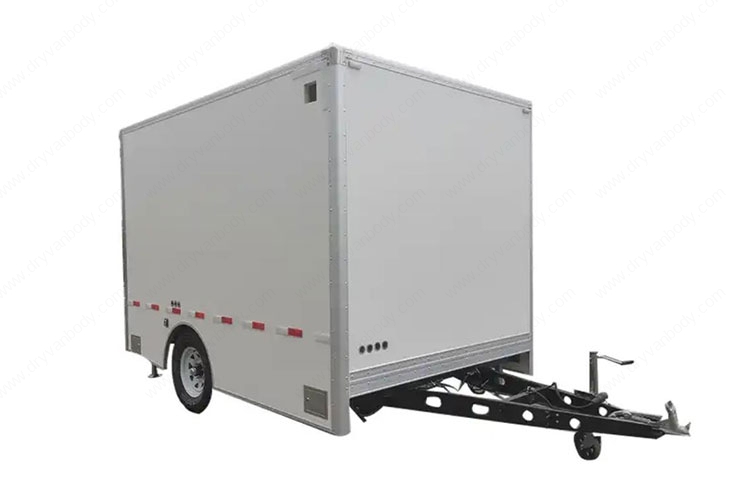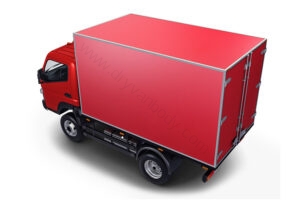Table of contents
A dry van trailer is a vehicle used for hauling cargo. The boxes it hauls are insulated, heat-insulating, UV-proof, and impact-resistant. Therefore, non-perishable items are often transported this way.
Understanding Dry Van Trailers

A dry van trailer is a large, enclosed box used to transport freight. Unlike flatbed or refrigerated trailers, dry vans do not have a temperature control system. They are designed for transporting non-perishable goods.
No climate conditioning is required during transportation. This makes them ideal for transporting a variety of items, from electronics to furniture.
Key Features of Dry Van Trailers
- Enclosed Space: The enclosed structure of a dry van trailer protects cargo from external elements such as weather and road debris.
- Security: The enclosed design also provides greater security for transported goods, reducing the risk of theft or damage.
- Versatility: Dry trucks are favored by many industries as they can transport agricultural products, clothing, electronics, etc.
What Are the Shipping Options for Dry Van Trailers?
In the trucking industry, dry truck trailers are used for both less-than-truckload (LTL) and full-load (FTL) hauling. Different features and advantages meet diverse freight needs and choices.
Less Tuck Loading Dry Truck Shipping (LTL)
LTL shipping is when a small amount of goods that need to be transported across destinations are loaded into a trailer with other goods. The characteristics of this transport mode are:
- Shared trailer space: LTL shipping allows multiple customers to share the cost of using one trailer.
- Cost savings: Transportation costs are calculated based on the proportion of space the goods occupy. This method can effectively reduce transportation costs when the goods are insufficient to fill the entire vehicle.
- Small and medium-sized freight: The LTL model is suitable for small-volume cargo transportation needs with flexible time requirements.
Full Truck Loading Dry Truck Shipping (FTL)
In contrast, full-load shipping is designed for large or bulk shipments that require a full truckload. Features are as follows:
- Dedicated Trucking: Tow truck with only one customer’s cargo.
- High cargo safety: No transshipment is required during transportation, minimizing the risk of damage.
- Higher efficiency: The whole vehicle of goods is transported directly from the place of shipment to the destination without transshipment, saving time and cost.
When choosing a suitable shipping method, you need to consider the weight, volume, characteristics, timeliness requirements, and budget of your cargo. LTL shipping is more economical in the case of small batches or smaller shipments, while FTL is more suitable for bulky or truckload shipments.
For fragile or high-value items, FTL can reduce the risk of transit; if time is of the essence, FTL can provide a faster transportation path.
LTL can effectively reduce costs when the budget is limited, while FTL is suitable when the budget is abundant and the transportation needs are clear.
What Sizes Are Available for Dry Van Trailers?
These trailers can be standard or customized, depending on your actual needs.
- 26ft
- 28ft
- 48ft
- 53ft
- Box truck
| Trailer Type | Dimensions | Weight Capacity | Maximum Pallets |
| 26 Foot Trailer | 24’ x 8’ x 8’6” | 10,000 Pounds | 8 – 10 Pallets |
| 28 Foot Trailer | 28’ x 8’ x 9’ | 24,500 Pounds | 12 – 14 Pallets |
| 48 Foot Trailer | 48’ x 8’6” x 8’6” | 43,000 Pounds | 22 – 24 Pallets |
| 53 Foot Trailer | 53’ x 8’6” x 8’6” | 45,000 Pounds | 24 – 26 Pallets |
CARBODY provides customers with lighter, sturdier and more environmentally friendly trailer bodies, and launches a variety of composite panel bodies to meet the needs of different industries: aluminum composite panel bodies, fiberglass sandwich panel bodies, glass fiber honeycomb sandwich panel bodies, etc.
What Do Dry Van Trailers Transport?
Dry trucks are used to transport non-perishable items and any merchandise that does not require refrigeration or special handling.
- Agricultural equipment
- Auto parts
- Beauty products
- Apparel
- Furniture
- Pharmaceuticals, medical equipment
- Industrial equipment
- Electronics
- Cleaning products
- Building materials
- Food and beverages
Benefits of CARBODY Dry Cargo Trailers
Our team of engineers can provide you with customized trailer body services, combining your needs with in-depth analysis of the performance and applications of various materials.
CARBODY customizes the best solution for you to ensure the best balance of quality, cost and efficiency. The benefits of choosing our trailer are as follows:
- Precise drawing design
- Efficient, high-precision, large-scale production
- Quick assembly of the body, support for CKD and SKD unit customization services
- CARBODY trailer body kit integrated panel
- Quick assembly using simple tools such as screws and screw guns
- 4 people + 2 hours = 1 box
- More efficient than traditional welding processes, saving labor, site and time costs


